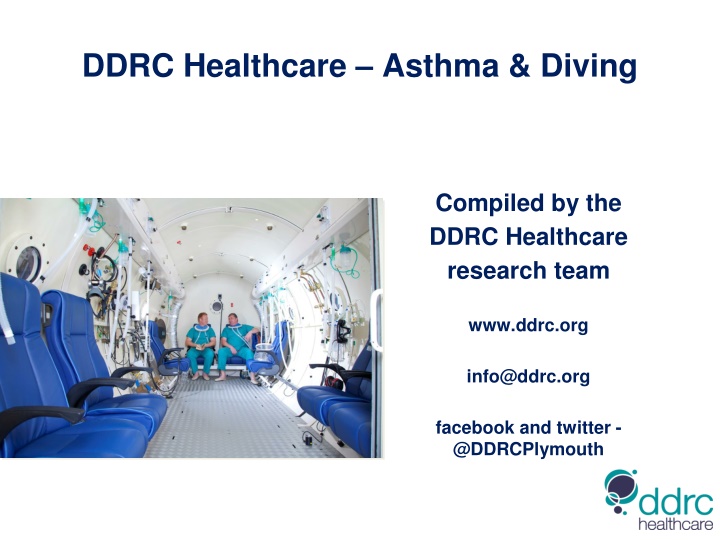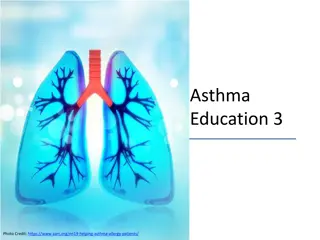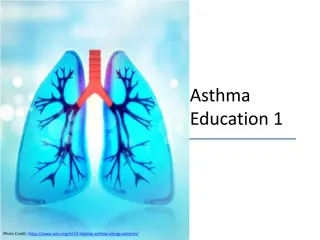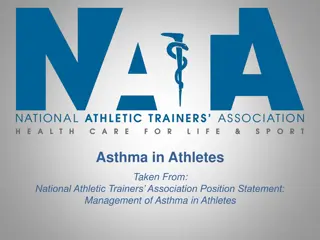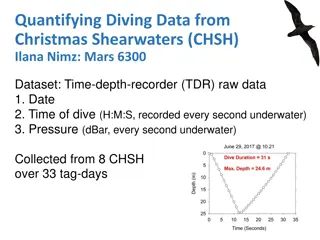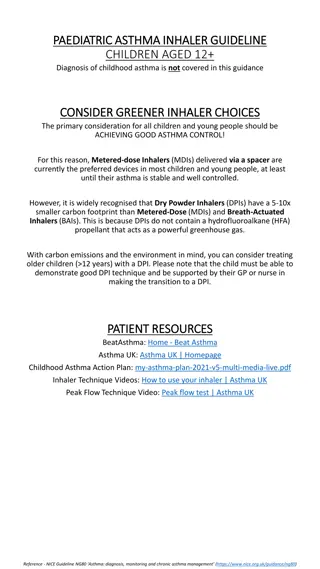DDRC Healthcare -Asthma & Diving
Asthma is a common condition affecting all age groups, with triggers including animals, pollutants, colds, exercise, and more. Learn about symptoms, management with medications, and the risks of diving with asthma. Discover why cold, exercise, and emotional triggers are considered contraindications for diving, as lung damage and DCI can pose life-threatening risks.
Download Presentation

Please find below an Image/Link to download the presentation.
The content on the website is provided AS IS for your information and personal use only. It may not be sold, licensed, or shared on other websites without obtaining consent from the author.If you encounter any issues during the download, it is possible that the publisher has removed the file from their server.
You are allowed to download the files provided on this website for personal or commercial use, subject to the condition that they are used lawfully. All files are the property of their respective owners.
The content on the website is provided AS IS for your information and personal use only. It may not be sold, licensed, or shared on other websites without obtaining consent from the author.
E N D
Presentation Transcript
DDRC Healthcare Asthma & Diving Compiled by the DDRC Healthcare research team www.ddrc.org info@ddrc.org facebook and twitter - @DDRCPlymouth
Asthma & Diving What is asthma? It is one of the most common medical conditions It can affect all age groups, often starting in childhood 8 million people in the UK have been diagnosed but Asthma UK data suggest 5.4 million people have received treatment so Research has suggested asthma may be over-diagnosed
Asthma & Diving What can cause asthma? Contact with something that irritates the airways This is called an asthma trigger: Animals, air pollutants, colds & viral infections, emotions, exercise, food, hormones, house-dust mites, medicines, moulds & fungi, pollen, sex, smoking, weather
Asthma & Diving The trigger causes the following to happen: Muscles around the walls of the airways tighten Airways become narrower Lining of airways becomes inflamed and starts to swell Mucus or phlegm can build up The reactions cause the airways to become narrower and irritated - making it difficult to breath and leading to symptoms of asthma
Asthma & Diving The symptoms: Coughing Wheezing Shortness of breath Tightness in the chest The symptoms differ from one person to the other, not everyone will have all the symptoms
Asthma & Diving There is no cure for asthma It is a lifelong condition, an asthma attack can occur unexpectedly Most people control their asthma with medications. These may include reliever and/or preventer inhalers, steroids, other oral medications, or nebulisers Medications enable an asthma sufferer to get on with their daily normal life
Asthma & Diving Can I go diving if I have asthma? Narrowing of airways in asthma can cause air to be trapped in the lungs If this happens whilst diving, changes in pressure can cause damage to the lungs or a burst lung This lung damage can cause DCI as air bubbles pass into the blood. This is life threatening. Therefore cold, exercise and emotional asthma triggers are a relative contraindication for diving
Asthma & Diving Can I go diving if I have asthma? There has been a huge amount of debate between the dive training organisations, the medical fraternity, and even between countries regarding whether it is safe for people with asthma to dive because of this controversy In 2003 a UK working party was established (the British Thoracic Society Fitness to Dive Group) to formulate national recommendations for assessing respiratory fitness to dive
Asthma & Diving The 2003 document can be downloaded and more information is available from The UK Diving Medical Committee (UKDMC) and DDRC Healthcare https://www.ncbi.nlm.nih.gov/pmc/articles/PMC1746450/pdf/ v058p00003.pdf http://www.ukdmc.org/medical-conditions/asthma/ https://www.ddrc.org/diving/can-i-dive/can-i-dive-asthma/
Asthma & Diving The Guidelines Five elements in the 2003 document: 1. 1. The diving environment 2. Potential risks to diving 3. Assessment of respiratory fitness to dive 4. Recommendations on specific respiratory conditions 5. Long term effects of diving on the lung
Asthma & Diving The Guidelines Potential risks to consider: Swimming in strong currents Rescuing a buddy in an emergency Diving is associated with lung rupture The gas breathed by the diver may be very cold Good buoyancy control is essential
Asthma & Diving The bottom line All asthmatics should be managed in accordance with the accepted guidelines in their country of origin All asthmatics should have a consultation with a diving doctor to determine if they are able to dive safely An asthmatic diver should not dive if he/she has needed a therapeutic bronchodilator ( reliever inhaler ) in the last 48 hours or has had any other chest symptoms
Who and what is DDRC Healthcare? Emergency recompression Education Fitness to dive advice Research Training Wound Care Medicals Building the future
